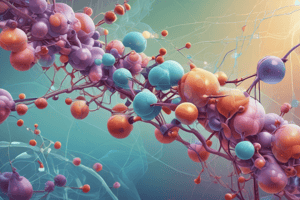Podcast
Questions and Answers
What are the key topics covered in Pharmacology and Medicinal Chemistry lectures at the beginning of the semester?
What are the key topics covered in Pharmacology and Medicinal Chemistry lectures at the beginning of the semester?
Basics of Pharmacology, drug effects, Pharmacokinetics, pharmacodynamics, toxicology, chemotherapy, adverse drug reactions
Why is understanding drug kinetics and dynamics essential in the study of Pharmacy?
Why is understanding drug kinetics and dynamics essential in the study of Pharmacy?
To comprehend how drugs behave in the body and their mechanisms of action
How are certain substances discussed in the text beneficial in therapeutic treatments?
How are certain substances discussed in the text beneficial in therapeutic treatments?
Reducing pain and inflammation, thinning blood, acting as anti-inflammatory agents
What key concepts are emphasized when discussing drug effects in Pharmacology?
What key concepts are emphasized when discussing drug effects in Pharmacology?
Who is a key historical figure mentioned in the text in relation to pharmacology?
Who is a key historical figure mentioned in the text in relation to pharmacology?
What is the significance of studying the effects of drugs on body tissues?
What is the significance of studying the effects of drugs on body tissues?
Explain the role of pharmaceutical industries in producing medicines.
Explain the role of pharmaceutical industries in producing medicines.
What is the essential drugs concept introduced by the World Health Organization?
What is the essential drugs concept introduced by the World Health Organization?
How does the molecular weight of drugs impact their properties and actions?
How does the molecular weight of drugs impact their properties and actions?
Why is it important to distinguish between organic and inorganic drugs?
Why is it important to distinguish between organic and inorganic drugs?
Flashcards are hidden until you start studying
Study Notes
- Starting a new semester in Pharmacy with lectures on Pharmacology and Medicinal Chemistry.
- Emphasizing the importance of Pharmacology and Medicinal Chemistry subjects in the fourth semester.
- Mentioning that these subjects will be crucial in later semesters as well.
- Explaining the basics of Pharmacology, including drug nature, sources, essential drug concepts.
- Connecting Pharmacology to the backbone of Medicine.
- Discussing drug effects like pain relief, fever reduction, and their mechanisms of action.
- Describing Pharmacokinetics as crucial to understanding how drugs behave in the body.
- Highlighting the process of drug absorption, distribution, metabolism, and elimination in the body.
- Introducing concepts like pharmacodynamics, toxicology, chemotherapy, and adverse drug reactions.
- Stressing the importance of understanding drug kinetics and dynamics in the study of Pharmacy.- The text discusses the benefits of certain substances in reducing pain and inflammation, thinning blood, and acting as anti-inflammatory agents.
- It mentions the use of these substances in various countries for their therapeutic effects on target sites in the body.
- The text refers to the concept of adverse effects that can occur with medications and the importance of understanding the distribution, absorption, and action of drugs.
- It touches on the historical background of pharmacology, highlighting key figures like Alexander Fleming who discovered penicillin.
- The text emphasizes the importance of studying the effects of drugs on body tissues, including the medicinal effects of plants like neem, giloy, and tulsi in treating infections and boosting immunity.
- It discusses the role of pharmaceutical industries in producing medicines and the significance of pharmaceutical studies in understanding dosage, metabolism, and drug interactions.
- The text also delves into the significance of genetics in personalized medicine and the impact of drug sources, whether from animals, plants, synthetic sources, or minerals, on drug development.
- It explains the differences between medicines and drugs, highlighting the role of pharmaceutical companies in manufacturing medications and the importance of understanding drug nature, whether organic or inorganic.
- The text mentions specific examples like insulin production from pancreatic cells and the distinction between organic and inorganic drugs in terms of their nature and source.- Organic nature of drugs in organic and inorganic forms discussed.
- Examples of lithium carbonate and organic compounds provided.
- Mention of drugs like morphine mostly in solid form.
- Different drug forms: solid, liquid (e.g., glycerol), gas (e.g., laughing gas).
- Molecular weight of drugs affects their properties and actions.
- Importance of maintaining ideal molecular weight for effective drug action.
- Essential drugs concept introduced by the World Health Organization in 1977.
- Initially, 28 medicines classified as essential drugs, later increased to 208.
- Essential drugs should be affordable, of high quality, and quantity should be adequate.
- Essential drugs vary between countries based on climate and healthcare needs.
- Regular updates and adjustments to essential drug lists are necessary based on healthcare trends and requirements.
Studying That Suits You
Use AI to generate personalized quizzes and flashcards to suit your learning preferences.




